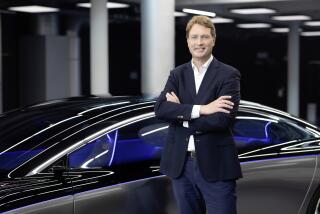Conference on Experimental Programs : Europeans Plug Benefits of Electric Cars
- Share via
BRUGES, Belgium — Forget the roar of engines and the clouds of exhaust. In the 21st Century the streets of Europe could hum with the sound of electric motors.
That is the vision shared by a growing number of Europeans who see in the battery-powered car a remedy to the damage exhaust fumes are doing to cities and forests alike.
To these enthusiasts, the environmental advantages of electric vehicles are beginning to outweigh such shortcomings as low range and high cost.
“We aim to introduce several million electric-driven cars by the end of this century,” European Community Transport Commissioner Karel van Miert told Reuters at a conference for electric transport experts here.
“We want to encourage cities that are doing experiments with these cars,” Van Miert said. “I believe in these experiments, and that’s why we want to support them.”
The seminar brought together more than 100 representatives from France, Belgium, Britain, Italy and West Germany whose towns are already using experimental electric fleets.
As the group was meeting, a convoy of battery-powered buses, vans, cars and motorized bicycles was winding its way through the cobblestone streets outside.
“I think the vehicles of the future will all be driven by electric motors. Their great advantage is they are pollution-free,” said Gaston Maggetto, a professor of electrical engineering at the Flemish Free University in Brussels.
Maggetto has for 10 years run a system using electric cars as rentals from the university campus. Students and members of the academic staff pay about 25 cents a mile to drive the three- or five-person cars around the city.
“The people using the system have reacted very positively to it despite its limitations,” he said.
Maggetto is actually a recent convert to battery power.
“I crashed my own car two years ago, so I decided to stick to electric cars for a year,” he said. “Driving electric was no problem for me.”
The vehicles are touted as clean, quiet and able to reach speeds of up to 50 m.p.h. Proponents also say that the vehicles are reliable and economical.
“They are much cheaper to run than conventional cars,” said David Porter of Britain’s Central Electricity Generating Board. “The cost of fuel is very much lower because electricity is cheaper than petrol (gasoline). And people generally want to recharge them at night, when there is plenty of spare generating capacity.”
Fewer maintenance requirements are another asset. “An internal combustion engine has about 100 moving parts; an electric motor has only one,” Porter said.
So why are there still so few electric cars on European roads?
“The potential for electric vehicles is limited at the moment by their range, which is typically only 40 miles. After that, they must be recharged for eight hours,” Porter said.
“They also cost between twice and three times as much to build as thermal cars,” he said. “Of course, if you made lots of them, they would be a lot cheaper.”
Scientists in Britain and Germany are investigating sodium-sulfur batteries, which provide four times as much energy as conventional lead-acid batteries of the same weight.
“Developing the sodium-sulfur battery has been a long, hard slog, but the results now look very promising,” Porter said.
That battery will lengthen electric vehicles’ range to between 100 and 150 miles and will also make them faster.
“There is no reason with sodium-sulfur batteries why you can’t build a car that does 80 m.p.h.,” Porter said. “The technology to do that will be available within the next few years.”
The experts agreed that at the moment, electric cars are best suited to urban areas.
“In cities, range is not really a limitation. You can travel a few miles to a job, then recharge while you’re stopped,” Maggetto said.
Maggetto said he favors a system whereby drivers would drive their own cars to a lot outside a city, then take trains or trams to the center, where they would rent coin-operated electric cars.
Maggetto and Porter both said the initial investment required makes government help essential.
“You can get around the cost problem in several ways: You can inject large amounts of cash, you can give tax incentives, or you can legislate,” Porter said.
“There must be political action because the pollution-free aspect of the electric car is an advantage to the whole community, not just to the individual,” Maggetto said.
More to Read
Sign up for Essential California
The most important California stories and recommendations in your inbox every morning.
You may occasionally receive promotional content from the Los Angeles Times.













